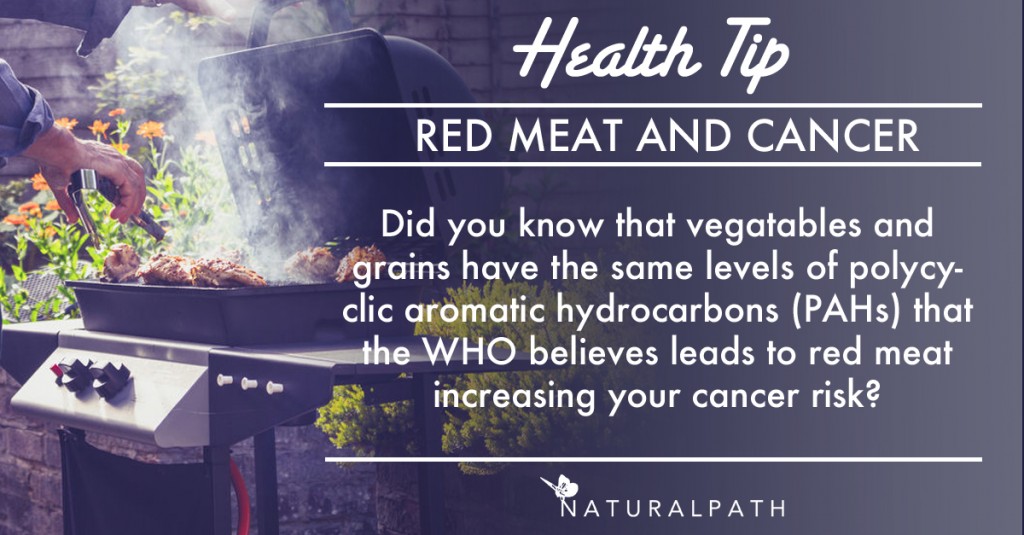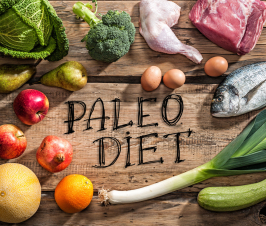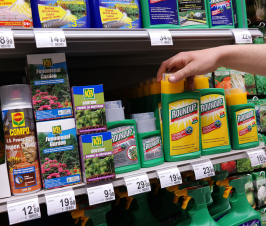Dr. Marc Bubbs, ND, CSCS
@DrBubbs
Earlier this week the World Health Organization (WHO) announced that processed red meats are a “human carcinogen” and red meats a “probable human carcinogen” that increase your risk of cancer. Those are powerful words and unsurprisingly they spread like wildfire within just a few hours.
Perhaps not too many people are surprised to read that traditional processed meats (e.g. hot dogs, salamis, sausages), with so many fillers and additives, are not good for your gut health. But, where do naturally and pasture-raised meats without preservatives or additives, like bacon and homemade sausages fit in?
However, what many health professionals (including myself) are shocked about, is that red meat (e.g. steak, lamb, veal, etc.) was also included. Red meat is one of nature’s best sources of healthy fat, essential amino acids, iron, zinc, and B12 so how did it get lumped in with the processed meats?
Unfortunately, in today’s Twitter world of 140 characters or less, a controversial headline gets a lot of media play. Let’s take a closer look at the WHO summary and see what the document actually reveals.
Processed Red Meat is a Human Carcinogen
The WHO defined processed red meat as a “human carcinogen” because they believe there is sufficient evidence that the agent causes cancer in humans and/or animals. They believe (and there is good evidence) that carcinogenic compounds like nitrosamines and polycylic aromatic hydrocarbons (PAHs) – produced during curing, salting and smoking – are leading to an increase risk of cancers. It’s these specific compounds that worries the WHO and led to their conclusions.
The Group 1 category also includes things like smoking, radiation, plutonium, etc. However, the report notes that just because smoking and processed red meat are both included in Group 1, it doesn’t mean they confer the same risk of cancer.
Relative Risk vs. Absolute Risk
The report states that processed red meat and red meat consumption increases your risk of colorectal cancer (not all types of cancer) by 17% for every 100g. This seems high, but you must remember that “relative risk” is a statistical term researchers use to compare the risk between two groups.
For example, the WHO has just stated you’re at 17% increase risk of colorectal cancer if you eat processed red meat. However, your true risk getting this type of cancer – called absolute risk– is only 5% for your lifetime according to the American Cancer Society.1 Using the relative risk term typically makes the “risk” seem greater than it actually is.
Other major risk factors for colorectal cancer are smoking, weight gain, obesity, diabetes, low fiber diet, sedentary lifestyle and alcohol use. If the meat you consume is placed between two buns with an order of fries and a sugar-laden soda at a fast food restaurant, then your choices will definitely be putting you at greater risk. However, it’s very different if you eat red meat as part of a healthy diet, rich vegetables, healthy fats and complex carbohydrates.
Why Is Red Meat Lumped In With Processed Meat?
This is where things get very grey. The direct quote for classifying red meat as a “possible carcinogen” in the report is based on, “limited evidence from epidemiological studies… that a positive association has been observed.” The evidence from the report gets even more speculative in the next sentence, stating “other explanations for the association (chance, bias, confounders) could not be ruled out”.
Association is not causation. Fire trucks appear at every fire in the city, and therefore are associated with fires, but they do not cause fires. The most troubling statement is that the relationship is so thin that “coincidence” or “luck” might explain the association. In fact, the WHO stated in their report that “red meat has known health benefits”, but not surprisingly this didn’t make the media headlines. Why then the tough stance on red meat?
High Temperature Cooking & Carcinogens
The root of the WHO’s concern with processed and natural red meat seems to stem from how we cook it. When we cook red meat – grilling, sautéing, searing, etc – it can lead to the production of carcinogenic compounds called nitrosamine, heterocyclic amines (HAs) or polycyclic aromatic hydrocarbons (PAHs), if it’s cooked with an open flame. These compounds are the real “bad guys” the WHO is concerned about and the likeliest reason processed red meat was included in Group 1 “human carcinogen” and red meat included in the Group 2A “possible carcinogen” category. However, what isn’t included in the report is that PAHs are found in the same concentrations in vegetables and grains, and even more concerning, virtually double the amount in the ambient environment (i.e. dust).2,3 That’s right, you get just as much PAHs from the rest of your dinner plate and are virtually exposed to them everyday in the environment. Seems unlikely they alone are the smoking gun.
Can You Mitigate The Negative Effects of Cooking Red Meat?
The good news is there are numerous cooking techniques that help to mitigate the potential negative effects of grilling or sautéing your meat. For example, marinating your meats (spices, honey, vinegars, etc.), cooking at lower temperatures (slow-cooker, braising, simmering, etc.) and choosing medium-rare over a “well done” steak, all significantly reduce the formation of carcinogens.
The research also shows that if you add leafy greens or green vegetables with your red meat it offsets the DNA damage from these carcinogens.4 The vegetables you add to your plate, along with fruit and friendly starches – potatoes, rice, yams – dramatically increase your fiber intake, building up “good” gut bacteria and reducing your risk of colorectal cancer.
Remember, the biggest risk factors for colorectal cancer are sedentary lifestyle, weight gain, obesity, diabetes, lack of fiber and constipation. Physical inactivity leads to a 10% increase in risk of colon cancers, and for every 4 inches you add to your waist, your risk of colorectal cancer increases by 20%.5,6 For two-thirds of the population who are classified as overweight or obese, it is especially important to promote good gut health, physical activity and a high-fibre, low carbs/sugar diet to reduce risks. If your bowel movements don’t occur daily and you “miss” days in the week, toxins build-up in the large intestine and put you at greater risk of colorectal cancer.
Animal protein, especially red meat, is one of the most nutrient dense foods on the planet. Marinated, cooked at moderate temperature, and served over a plate of leafy greens as part of diet high in fiber (e.g. the Paleo diet), red meat promotes good health, slimmer waistline and improve body composition. I see this everyday in clinical practice. While too many processed meats do present a potential risk factor and should be consumed in moderation, if you stay active, maintain a healthy weight and fill your plate with leafy greens your lifetime risk of developing colorectal cancer is only 5%.
Yours in health,
Dr. Marc Bubbs ND, CSCS
 Dr. Marc Bubbs, ND is a Naturopathic Doctor, Strength Coach, Speaker, Blogger, and Author of The Paleo Project – A 21st Guide to Looking Leaner, Getting Stronger, & Living Longer.Marc also serves as the Sports Nutrition Lead for the Canadian Men’s National Basketball Team and believes that diet, exercise, and lifestyle factors have the most profound impact on your overall health and performance.
Dr. Marc Bubbs, ND is a Naturopathic Doctor, Strength Coach, Speaker, Blogger, and Author of The Paleo Project – A 21st Guide to Looking Leaner, Getting Stronger, & Living Longer.Marc also serves as the Sports Nutrition Lead for the Canadian Men’s National Basketball Team and believes that diet, exercise, and lifestyle factors have the most profound impact on your overall health and performance.
References:
- http://www.cancer.org/cancer/colonandrectumcancer/detailedguide/colorectal-cancer-risk-factors. (viewed October 28th, 2015)
- Phillips, D. Polycyclic aromatic hydrocarbons in the diet. Mutation Research/Genetic Toxicology and Environmental Mutagenesis. Volume 443, Issues 1–2, 15 July 1999, Pages 139–147.
- Ma, Y. Harrad S. Spatiotemporal analysis and human exposure assessment on polycyclic aromatic hydrocarbons in indoor air, settled house dust, and diet: A review. Environ Int. 2015 Nov;84:7-16.
- Flood A, Velie EM, Chaterjee N, et al. Fruit and vegetable intakes and the risk of colorectal cancer in the Breast Cancer Detection Demonstration Project follow-up cohort. The American Journal of Clinical Nutrition 2002;75(5):936-943
- Moghaddam A, et al. Obesity and risk of colorectal cancer: a meta-analysis of 31 studies with 70,000 events. Cancer Epidemiol Biomarkers Prev. 2007 Dec;16(12):2533-47.
- Leitzmann, M. et al. European Code against Cancer 4th Edition: Physical activity and cancer. Cancer Epidemiol. 2015 Jul 15.


















